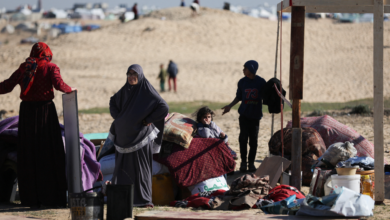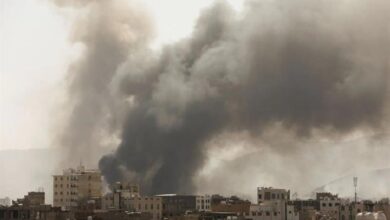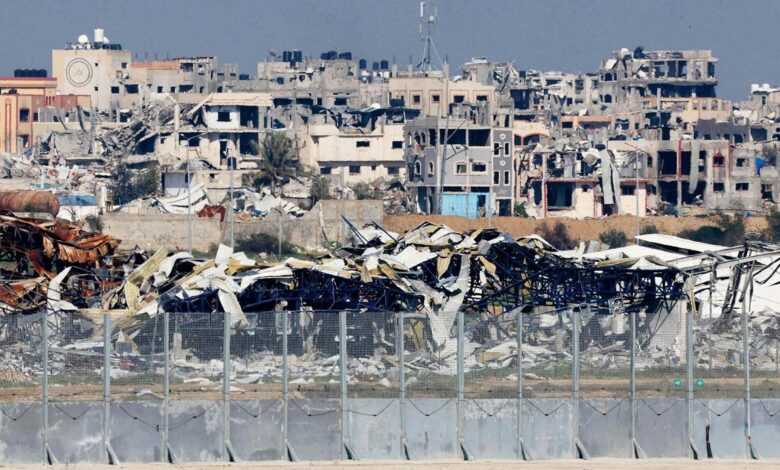
Israeli Officials Clash Over War Strategy
Signs of growing rifts among top Israeli officials over war strategy are emerging, casting a shadow over the nation’s security landscape. While Israel has always been a nation grappling with existential threats, the current disagreements among its leaders about how to best address these challenges raise serious concerns about the country’s ability to maintain its military edge and protect its citizens.
This tension is not a sudden development. Israel’s history is marked by internal debates about military strategy, often fueled by shifting political realities, differing security assessments, and even ideological divides. The current disagreements, however, seem particularly acute, fueled by a complex mix of factors, including the evolving nature of threats in the region, the rise of new technologies, and the increasing pressure on Israel to find a sustainable path to peace.
Background and Context
The current security situation in Israel is characterized by a complex web of challenges, including the ongoing conflict with Hamas in Gaza, the threat posed by Hezbollah in Lebanon, and the rise of Iranian influence in the region. These threats have been exacerbated by the ongoing political instability in Israel, with the country experiencing several rounds of elections in recent years.
This instability has led to a lack of consensus on key security issues, making it difficult for the government to formulate and implement a coherent strategy.
History of Israeli Military Strategy
The history of Israeli military strategy is marked by a constant adaptation to the changing security landscape. The early years of the state were characterized by a focus on defensive warfare, as Israel sought to survive against its numerous Arab neighbors.
However, as the country’s military strength grew, its strategy shifted towards a more offensive approach, aiming to preemptively strike at its enemies before they could attack. This shift was evident in the 1967 Six-Day War, where Israel launched a surprise attack on its neighbors, capturing vast amounts of territory.
The 1973 Yom Kippur War, however, demonstrated the dangers of overconfidence and the importance of maintaining a strong defense. This led to a renewed focus on defensive strategies, coupled with a reliance on intelligence gathering and technological advancements.
It’s fascinating to see the cracks appearing in Israel’s top ranks over war strategy, especially as the world watches the unfolding drama in the Red Sea. The recent escalation, with Israel facing scrutiny at the ICJ, France’s new PM, and the ongoing saga of Ecuador’s fight against drug cartels, alongside the Boeing saga, all add layers of complexity to the region.
These global events, while seemingly disparate, might be influencing the internal tensions within Israel’s leadership, further fueling the debate on how to proceed in the face of evolving threats.
Factions within the Israeli Government
The Israeli government is composed of a diverse range of political parties, each with its own views on war strategy. The main factions can be broadly categorized as follows:
- Hawks:These parties tend to favor a more aggressive approach to security, advocating for preemptive strikes and a willingness to use military force to achieve their goals. They often emphasize the need to deter potential enemies and maintain a strong military presence in the region.
- Doves:These parties generally favor a more cautious approach, prioritizing diplomacy and negotiations over military action. They tend to be more critical of the use of force and advocate for a more conciliatory approach towards Israel’s neighbors.
- Centrists:These parties fall somewhere between the hawks and the doves, seeking to balance the need for security with the desire for peace. They often support a pragmatic approach that combines military deterrence with diplomatic efforts to resolve conflicts.
The different viewpoints within the Israeli government often lead to disagreements over the best course of action in response to security threats. These disagreements can sometimes be particularly pronounced in the context of a potential war, as the stakes are high and the consequences of miscalculation can be devastating.
Signs of Growing Rifts: Signs Of Growing Rifts Among Top Israeli Officials Over War Strategy
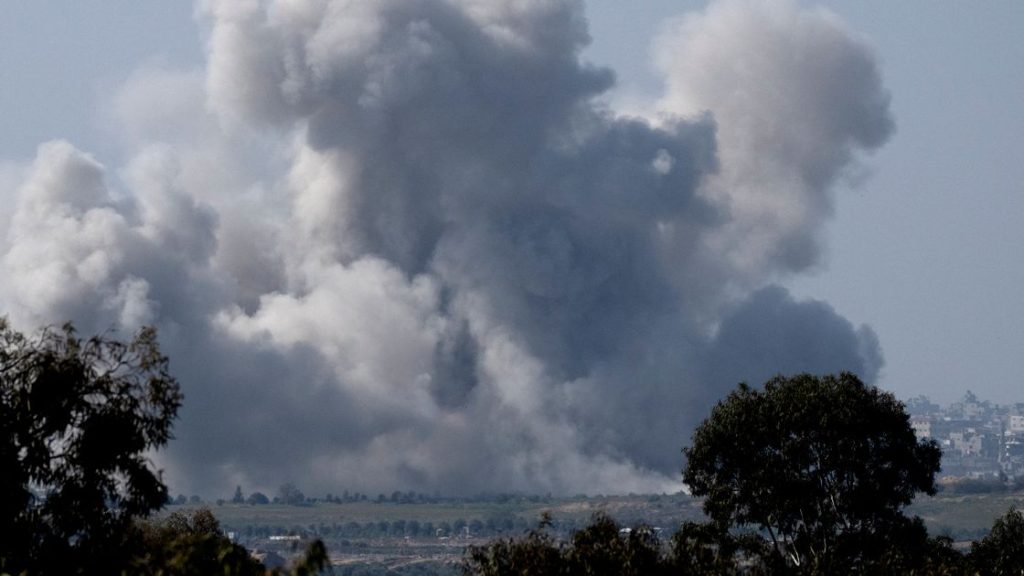
The recent escalation of tensions in the region has brought to light significant disagreements among top Israeli officials regarding war strategy. These rifts, while not entirely new, have become more pronounced and public in recent months, raising concerns about the coherence of Israel’s security policy.
Public Statements and Actions
The most evident signs of these disagreements are the public statements and actions of key figures in the Israeli government. For example, Defense Minister Benny Gantz has repeatedly expressed a cautious approach to military action, emphasizing the need for diplomacy and restraint.
In contrast, Prime Minister Benjamin Netanyahu has adopted a more hawkish stance, advocating for a more aggressive response to perceived threats. These differing perspectives have been reflected in their respective pronouncements on issues such as the Iranian nuclear program and the ongoing conflict in Gaza.
Causes of the Disagreements
The root causes of these disagreements are multifaceted and complex. Political pressures, differing security assessments, and ideological differences all play a role.
The recent reports of growing rifts among top Israeli officials over war strategy have added another layer of complexity to the already tense situation in the region. These disagreements are becoming increasingly public, fueled by the recent incident where Iran held funerals for guards killed in an alleged Israeli strike, as reported by newsflash360.site.
This incident has raised concerns about the potential for escalation and highlights the need for a clear and unified approach from Israel to navigate these turbulent times.
- Political Pressures: The upcoming elections in Israel have undoubtedly contributed to the public airing of these disagreements. Both Gantz and Netanyahu are vying for the support of voters who hold differing views on security matters. Gantz, for example, has sought to portray himself as a responsible leader who prioritizes peace and stability, while Netanyahu has emphasized his strength and decisiveness in dealing with threats.
- Differing Security Assessments: The Israeli intelligence community is not monolithic, and there are different perspectives on the nature and magnitude of threats facing the country. Some officials, like Gantz, may believe that a more measured approach is necessary to avoid unnecessary escalation, while others, like Netanyahu, may view the situation as more urgent and require a more proactive response.
- Ideological Differences: Beyond security assessments, there are also fundamental ideological differences that contribute to the rifts. For instance, Netanyahu’s Likud party has traditionally been associated with a more right-wing, hawkish approach to security, while Gantz’s Blue and White party is generally considered more centrist.
These contrasting ideological positions inevitably influence their respective views on war strategy.
Areas of Disagreement
The debate over Israel’s war strategy has been characterized by a growing rift between top officials, with stark differences in their views on the appropriate course of action. This division reflects the complexities of the situation and the multifaceted nature of the challenges facing Israel.
The Role of Military Force
The most significant point of contention centers on the appropriate role of military force in addressing the Israeli-Palestinian conflict. Some officials, advocating a more hawkish approach, believe that a decisive military campaign is necessary to achieve lasting security and deter future attacks.
They argue that a strong military response is the only way to demonstrate Israel’s resolve and ensure its survival. This perspective often emphasizes the need for a preemptive strike against potential threats, even if it carries the risk of escalating tensions.Others, taking a more cautious stance, believe that military force should be used as a last resort, and that diplomacy and political solutions are essential for achieving long-term peace.
They argue that military actions often lead to unintended consequences, including civilian casualties and increased regional instability. This perspective emphasizes the need for a more nuanced approach that takes into account the complex political and social realities of the conflict.
Potential Consequences

The growing rifts among top Israeli officials over war strategy carry significant implications for the country’s security, decision-making processes, and public trust. These disagreements, if left unchecked, could undermine Israel’s ability to effectively respond to threats and maintain its national security.
Impact on Israel’s Security
The potential consequences of these rifts on Israel’s security are multifaceted and could have far-reaching effects.
- Delayed and Inconsistent Decision-Making:Disagreements among key decision-makers can lead to delays in crucial decision-making processes, hindering Israel’s ability to respond swiftly and effectively to evolving security threats. For example, during the 2006 Lebanon War, disagreements within the Israeli government regarding the scope and duration of the military operation contributed to a protracted conflict and a less decisive outcome.
- Erosion of Strategic Coherence:A lack of consensus on war strategy can erode strategic coherence and undermine the effectiveness of Israel’s military operations. For instance, during the 2014 Gaza War, disagreements within the Israeli government over the use of ground troops led to a prolonged conflict with a high civilian casualty count.
- Increased Vulnerability to External Threats:A divided government can signal weakness to Israel’s adversaries, potentially emboldening them to take bolder actions. For example, the recent escalation of tensions with Iran and Hezbollah has been fueled, in part, by perceptions of internal divisions within the Israeli government.
Impact on Decision-Making Processes
Disagreements among top Israeli officials can significantly affect the country’s decision-making processes, leading to:
- Compromised Decision-Making:When key decision-makers are unable to reach a consensus, decisions may be made based on political expediency rather than strategic considerations. This can lead to suboptimal outcomes and undermine Israel’s long-term security interests.
- Increased Risk of Miscalculations:A lack of unity and clarity in decision-making can increase the risk of miscalculations, potentially leading to unintended consequences or escalations of conflict. For example, the 1967 Six-Day War was partly triggered by misperceptions and miscalculations on both sides, which could have been mitigated by a more unified and coordinated decision-making process.
- Weakened Diplomatic Leverage:Internal disagreements can weaken Israel’s diplomatic leverage in negotiations with regional and international actors. This can hinder Israel’s ability to secure its interests and advance its foreign policy objectives.
Impact on Public Trust and Morale, Signs of growing rifts among top israeli officials over war strategy
The public’s trust in the government is crucial for national unity and support for military operations. Public disagreements among top officials can erode this trust and undermine public morale.
- Erosion of Public Trust:Public perception of internal divisions can erode public trust in the government’s ability to effectively manage security challenges. This can lead to a decline in public support for military operations and a weakening of national resolve.
- Increased Social Polarization:Disagreements over war strategy can exacerbate existing social divisions and lead to increased polarization within Israeli society. This can make it more difficult to build consensus on critical security issues and weaken national unity.
- Undermining Public Support for Military Operations:A lack of public trust and unity can undermine public support for military operations, making it more difficult to sustain long-term campaigns and achieve strategic objectives.
Future Outlook
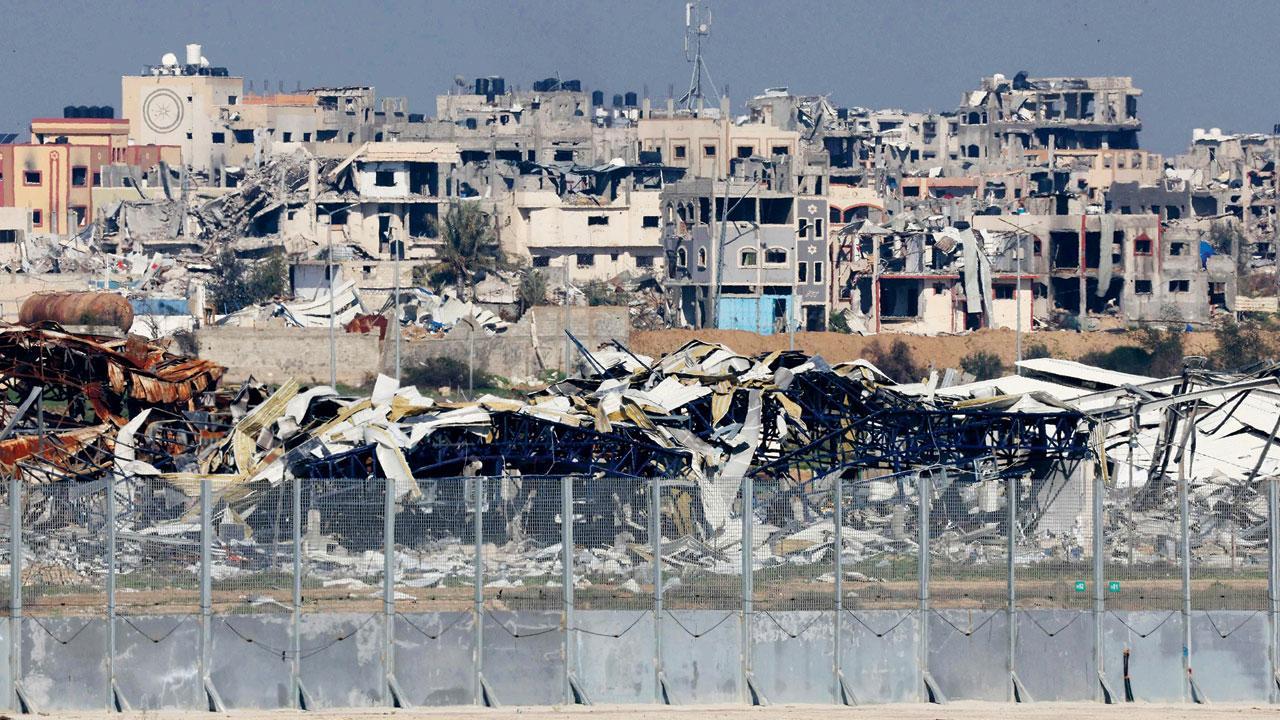
The growing rifts among Israeli officials over war strategy raise significant questions about the future direction of the country’s defense policy. While the current disagreements may seem insurmountable, there are various factors that could influence the resolution of these differences and shape Israel’s future war strategy.
Potential for Resolution
The likelihood of these rifts being resolved depends on several factors, including the severity of the disagreements, the willingness of key players to compromise, and the political climate in Israel. There are several possible scenarios:
- Negotiated Compromise:The most optimistic scenario involves a negotiated compromise between the different factions. This would require open dialogue, a willingness to acknowledge opposing viewpoints, and a commitment to finding common ground.
- Shifting Political Landscape:A change in the political landscape, such as a new government or a change in leadership, could also lead to a resolution of the rifts. This would depend on the new leaders’ views on war strategy and their ability to unite the different factions.
- Escalation of Tensions:In the worst-case scenario, the disagreements could escalate into a full-blown crisis, potentially leading to a more aggressive approach to war strategy. This scenario would be highly destabilizing for Israel and the region.
Potential Scenarios for Israel’s War Strategy
The future of Israel’s war strategy is highly uncertain, with several potential scenarios emerging from the current rifts. These scenarios depend on the resolution of the disagreements and the evolving geopolitical landscape:
- Continued Divergence:If the disagreements persist, Israel could see a continued divergence in its war strategy, with different factions pursuing their own approaches. This would lead to a fragmented and potentially ineffective defense policy.
- Shift towards Deterrence:A potential scenario involves a shift towards a more deterrence-based strategy, emphasizing the use of military force as a last resort and focusing on preemptive strikes and cyber warfare. This approach could be favored by those who advocate for a more cautious approach to conflict.
- Emphasis on Preemptive Strikes:Alternatively, Israel could adopt a more aggressive strategy, prioritizing preemptive strikes and a proactive approach to conflict. This approach would likely be supported by those who favor a more assertive stance against its adversaries.
Key Players, Positions, and Potential Outcomes
The following table summarizes the key players in the current debate, their positions on war strategy, and the potential outcomes of their respective viewpoints:
| Key Player | Position on War Strategy | Potential Outcome |
|---|---|---|
| Defense Minister | Advocates for a more aggressive approach, emphasizing preemptive strikes and a proactive stance against adversaries. | A more assertive war strategy, potentially leading to increased tensions and conflict. |
| Chief of Staff | Supports a more cautious approach, focusing on deterrence and the use of military force as a last resort. | A more restrained war strategy, prioritizing diplomacy and conflict avoidance. |
| Prime Minister | Has expressed a desire for a balanced approach, combining elements of both deterrence and preemption. | A middle ground approach, potentially leading to a compromise between the different factions. |
Concluding Remarks
The debate over Israel’s war strategy is a complex one, with no easy answers. The rifts among top officials are a reflection of the deep challenges facing the nation, both internally and externally. As Israel navigates this turbulent landscape, the ability of its leaders to find common ground on vital security issues will be crucial to ensuring the country’s long-term safety and prosperity.


